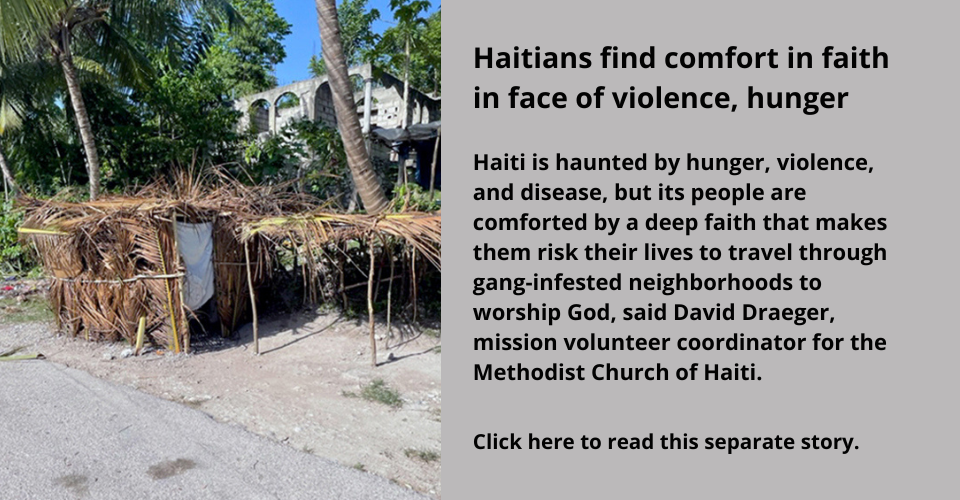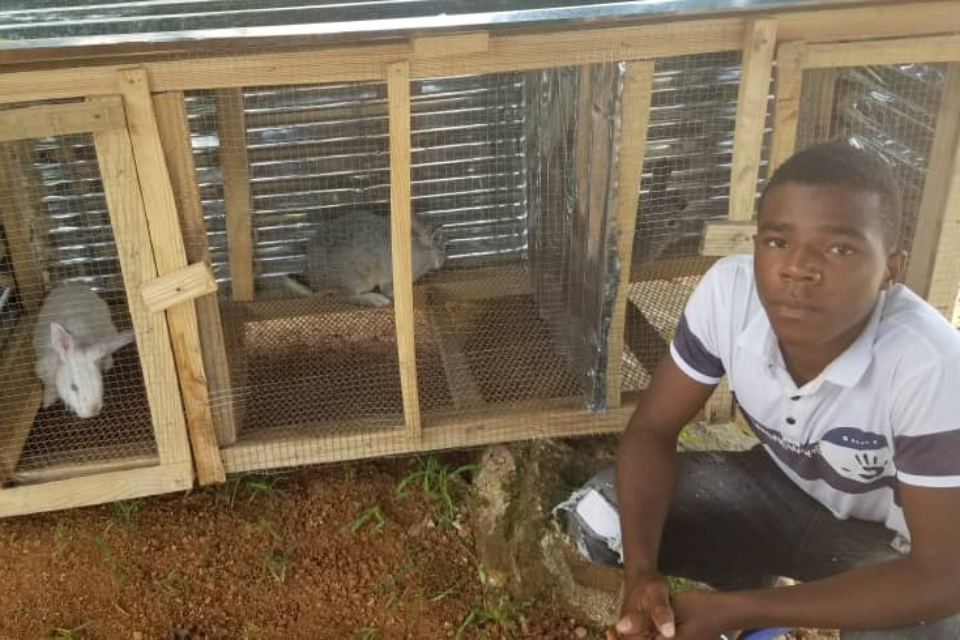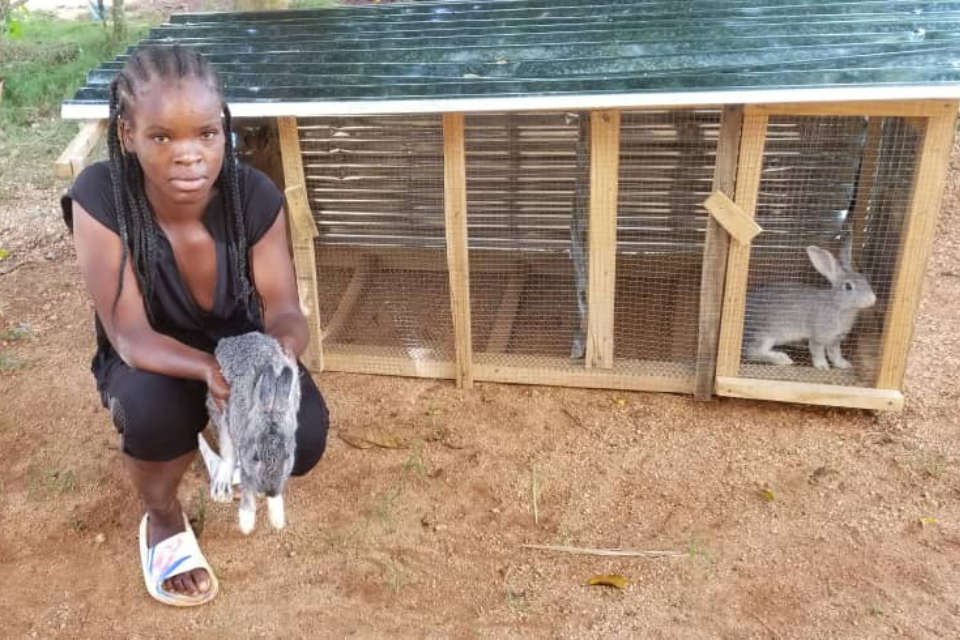STEP FOUR: Haitian Assets for Peace International continues to expand its services despite the growing challenges in the nation. HAPI offers Maternal care, vocational education, and animal husbandry to residents in Mizak.
KATHY L. GILBERT
UM News
Key points:
-
- Haitian Assets for Peace International adds healthy heart initiatives alongside maternal health care, vocational training, and other empowerment programs.
- HAPI will soon receive two echocardiogram units from CardioStart International to begin the training and certification of local Haitians.
- Resourcing local people is the key to Haiti gaining self-reliance, says Valerie Mossman-Celestin, director of HAPI.
Haitian Assets for Peace International, founded in 2007 to empower women to use their embroidery skills to produce income, will be soon receiving two echocardiogram units from CardioStart International to begin the training and certification of local Haitians.
This program joins HAPI’s Heart2Heart initiative, also supported by CardioStart International, which aims to B.E.A.T. women’s heart disease. (B.E.A.T. stands for basic training, education, awareness, treatment.) The Heart2Heart program started in November 2022.
Haitian Assets for Peace International is a ministry partner with United Methodist congregations in the Michigan Conference. It continues to grow and empower women, girls, and families to live healthy, happy lives.
In addition to the healthy heart initiatives, the Haitian Assets for Peace International operation includes maternal care (Felisane Health Center and Start Right), vocational education (HAPITech), and an animal husbandry program (HAPIGro).
Valerie Mossman-Celestin, director of HAPI, said receiving the two echocardiogram units is huge news.
“We can use this time as an incubator to nurture local capacity and new collaborations that can give birth to strong advances in decentralized and locally staffed care,” she said.
Resourcing local people is the key to Haiti gaining self-reliance, she said.
“Decentralizing goods and services to rural communities is an important element to developing and stabilizing the country.”
HAPI, located 100 miles from Port-au-Prince in Mizak, is far away from most of the violence in the country’s capital. But it is not so far away that it isn’t touched.

Mossman-Celestin said one of her husband’s cousins was kidnapped more than two weeks ago and has not been released. He is a mechanic and was called to fix a broken-down car by the owner of a taxi business. It turned out to be a trap.
“The target was the businessman who owned a taxi business. He was ‘set up’ by one of his drivers who had family in the Izo gang,” she said. “There is a huge concern that the cousin may be seen as expendable.”
Her sister-in-law was almost a victim but, at the last minute, changed her mind about boarding a bus that was later stopped by a gang and everyone on board was kidnapped.
“This is what it is like for families right now,” she said.
Growing HAPI news
HAPI’s Start Right maternal health care initiative is the “flagship” program that has driven growth through prenatal education and counseling, and access to contraception as moms share by word of mouth, Mossman-Celestin said. Birthing services are available at HAPI, or women can choose to deliver at Felisane Health Center.
The maternal health care initiative includes a mobile clinic they take to disabled people, part-time lab and dental services, a children’s nutrition service for severely malnourished children, along with urgent care and community health services.
Felisane Health Center serves Jacmel, a rural area southeast of Port-au-Prince. The center offers quality prenatal, obstetric, and postnatal care with an educational component for the mothers. It also strives to decrease malnutrition in pregnant mothers, infants, and children.
With support from the United Methodist Board of Global Ministries, the center offers staff additional training in ultrasound and HIV counseling, including quarterly HIV prevention workshops. A grant will help to install two solar-powered water sanitation units for the facility and a separate laundry station.
HAPI received EKG and ultrasound equipment as part of a 2022 Global Health grant from Global Ministries. The agency also provided funds for HAPI doctors and nurses to be trained in basic EKG and ultrasound procedures.
Another program of the organization is HAPIGro, a “pass the gift” approach with goats and rabbits, Mossman-Celestin said. United Women of Faith underwrites the youth animal husbandry initiative.
James Gulley with the United Methodist Committee on Relief started the program following the devastating 2010 earthquake in Haiti. Youth learn to care for their animals, and as offspring are born, they are gifted to other youth.

Mossman-Celestin said they started with goats but are transitioning to rabbits. The program includes monthly meetings with a worship component, other agronomy-related topics, lunch, and a time to share their experience.
“I am amazed at how much hope this program has brought to the youth—how having responsibility and control over something in their lives impacts their outlook,” she said
Mossman-Celestin said HAPITech provides vocational training in ESL (English as a second language), computers, electrical, ceramic tiling, and window installation, with 100 enrolled currently.
It took some time for people to take an interest in learning to use computers, she said.
“People just didn’t understand the need for a computer while they were sitting on the side of a mountain. They couldn’t understand how that could lead to a paying job.
“Now, we don’t have enough laptops and are turning students away,” Mossman-Celestin said.
“At HAPI, this has been a season of growth, new partnerships, and opportunities that keep me awake at night out of excitement.”
How to help
Donations can be made to HAPI through The United Methodist Church’s Advance giving platform by using this secure link.
Funds to support the ministry of HAPI may also be made through their partnership with EngageMI: Step 4 Haitian Artisans for Peace International (HAPI) Advance #3020490.
Go to the EngageMI website to learn more about other Ministry Partners of the Michigan Conference and how to become an EngageMI congregation.
~ Kathy L. Gilbert is a freelance writer in Nashville, TN.
-----------
Valerie Mossman-Celestin shared a poem written by one of the youth in the HAPIGro program:
My name is Rachel,
I am happy to write this poem for you.
A bad breeder and Lucifer has no difference with darkness.
Because when you do animal husbandry well, you are a light that illuminates the dark.
Everyone wants to raise goats, rabbits, or cows but they find it very difficult to do so.
If everyone has known the importance of animal husbandry, we will not be in slavery anymore,
our leaders would be more sincere, and we wouldn’t lose a young like Eveline Sincere.
We will not hear about crimes and assassinations on the radio like an advertisement.
All the young on the street will find work and food, they will not need to use guns.
No one would need to steal, to kill for having money, they would work, they would farm to make money. No one would be ambitious about what others own.
Lucner would have cows, Mirleine would have pigs. Everyone would survive in what they own.
The young wouldn’t have to go pray on the mountain to find a diaspora.
However, they would do animal husbandry and farming.
Our leaders wouldn’t need to fight each other, there would be no complaints.
I am writing this text to tell you if you don’t do animal husbandry and farming you are working in vain.

